| Listing 1 - 9 of 9 |
Sort by
|
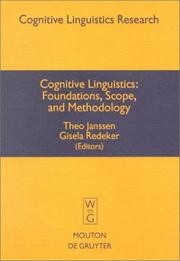
ISBN: 311016163X 3110161648 1306272343 3110803461 9783110803464 9783110161649 9783110161632 Year: 1999 Volume: 15 Publisher: Berlin: Mouton de Gruyter,
Abstract | Keywords | Export | Availability | Bookmark
 Loading...
Loading...Choose an application
- Reference Manager
- EndNote
- RefWorks (Direct export to RefWorks)
No detailed description available for "Cognitive Linguistics".
Psycholinguistics --- Cognitieve spraakkunst --- Cognitive grammar --- Grammaire cognitive --- Grammar [Cognitive ] --- Spraakkunst [Cognitieve ] --- Cognitive grammar. --- 801.56 --- Syntaxis. Semantiek --- Languages & Literatures --- Philology & Linguistics --- 801.56 Syntaxis. Semantiek --- Cognitive linguistics --- Linguistique cognitive --- Psycholinguistique cognitive --- Grammar, Comparative and general
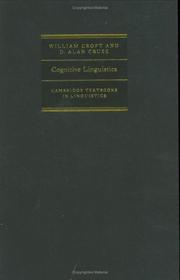
ISBN: 0521661145 0521667704 1107142636 1282394479 9786612394478 0511644027 051114038X 0511556381 0511803869 0511139136 0511139632 9780511140389 9780511139635 9780511803864 9780521661140 9780521667708 9781107142633 9780511644023 6612394471 9781282394476 9780511139130 9780511556388 Year: 2004 Volume: *19 Publisher: Cambridge: Cambridge university press,
Abstract | Keywords | Export | Availability | Bookmark
 Loading...
Loading...Choose an application
- Reference Manager
- EndNote
- RefWorks (Direct export to RefWorks)
Cognitive Linguistics argues that language is governed by general cognitive principles, rather than by a special-purpose language module. This introductory textbook surveys the field of cognitive linguistics as a distinct area of study, presenting its theoretical foundations and the arguments supporting it. Clearly organised and accessibly written, it provides a useful introduction to the relationship between language and cognitive processing in the human brain. It covers the main topics likely to be encountered in a course or seminar, and provides a synthesis of study and research in this fast-growing field of linguistics. The authors begin by explaining the conceptual structures and cognitive processes governing linguistic representation and behaviour, and go on to explore cognitive approaches to lexical semantics, as well as syntactic representation and analysis, focusing on the closely related frameworks of cognitive grammar and construction grammar. This much-needed introduction will be welcomed by students in linguistics and cognitive science.
Psycholinguistics --- Cognitieve spraakkunst --- Cognitive grammar --- Grammaire cognitive --- Grammar [Cognitive ] --- Spraakkunst [Cognitieve ] --- 801.56 --- Syntaxis. Semantiek --- Cognitive grammar. --- 801.56 Syntaxis. Semantiek --- Cognitive linguistics --- Linguistique cognitive --- Psycholinguistique cognitive --- Grammar, Comparative and general --- Arts and Humanities --- Language & Linguistics --- Grammar, Comparative and general.
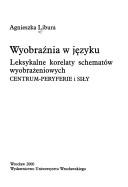
ISSN: 02396661 ISBN: 8322920423 9788322920428 Year: 2000 Volume: 2165 Publisher: Wrocław: Wydawnictwo uniwersytetu Wrocławskiego,
Abstract | Keywords | Export | Availability | Bookmark
 Loading...
Loading...Choose an application
- Reference Manager
- EndNote
- RefWorks (Direct export to RefWorks)
Cognitieve spraakkunst --- Cognitive grammar --- Grammaire cognitive --- Grammar [Cognitive ] --- Spraakkunst [Cognitieve ] --- Lexicology. --- Lexical grammar. --- Cognitive grammar. --- Lexical grammar --- Lexicology --- English language --- Language and languages --- Generative grammar --- Grammar, Comparative and general --- Cognitive linguistics --- Psycholinguistics --- Linguistique cognitive --- Psycholinguistique cognitive --- Étimologie --- Linguistique
Book
ISBN: 3631506422 Year: 2003 Volume: 50 Publisher: Frankfurt am Main ; Bruxelles ; New York Peter Lang
Abstract | Keywords | Export | Availability | Bookmark
 Loading...
Loading...Choose an application
- Reference Manager
- EndNote
- RefWorks (Direct export to RefWorks)
Cognitieve spraakkunst --- Cognitive grammar --- Communicatie --- Communication --- Communication [Primitive ] --- Communication humaine --- Grammaire cognitive --- Grammar [Cognitive ] --- Langage [Sciences du ] --- Langage [théorie du ] --- Linguistic science --- Linguistics --- Linguistique --- Linguïstiek --- Mass communication --- Pragmatics --- Pragmatiek --- Pragmatique --- Science of language --- Sciences du langage --- Spraakkunst [Cognitieve ] --- Taalkunde --- Taalwetenschap --- Théories du langage --- Cognitive linguistics --- Linguistique cognitive --- Psycholinguistique cognitive
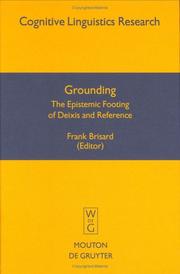
ISBN: 3110173697 3111856518 3110899809 9783110899801 9783110173697 Year: 2002 Volume: 21 Publisher: New York ; Berlin Walter de Gruyter
Abstract | Keywords | Export | Availability | Bookmark
 Loading...
Loading...Choose an application
- Reference Manager
- EndNote
- RefWorks (Direct export to RefWorks)
This compilation of invited contributions, gathering an international collection of cognitive and functional linguists, offers an outline of original empirical work carried out in grounding theory. Grounding is a central notion in cognitive grammar that addresses the linking of semantic content to contextual factors that constitute the subjective ground (or situation of speech). The volume illustrates a growing concern with the application of cognitive grammar to constructions establishing deixis and reference. It proposes a double focus on nominal and clausal grounding, as well as on ways of integrating analyses across these domains.
Cognitieve spraakkunst --- Cognitive grammar --- Cognitive linguistics --- Grammaire cognitive --- Grammar [Cognitive ] --- Linguistique cognitive --- Psycholinguistique cognitive --- Reference (Linguistics) --- Référence (Linguistique) --- Spraakkunst [Cognitieve ] --- Verwijzing (Taalwetenschap) --- Linguistics --- Philosophy of language --- Comparative linguistics --- Grammar --- Pragmatics --- Cognitive grammar. --- Grammar, Comparative and general --- Deixis. --- Signification (Linguistics) --- Deixis (Linguistics) --- Deictic function --- Onomasiology --- Semantics --- Indexicals (Semantics) --- Psycholinguistics --- Grammar [Comparative and general ] --- Deixis --- Philology
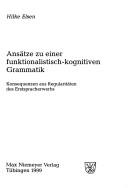
ISBN: 3484304030 3110915979 Year: 1999 Volume: 403 Publisher: Tübingen Max Niemeyer Verlag
Abstract | Keywords | Export | Availability | Bookmark
 Loading...
Loading...Choose an application
- Reference Manager
- EndNote
- RefWorks (Direct export to RefWorks)
Warum sind sprachliche Strukturen so, wie sie sind? Wie entstehen sie? Warum verändern sie sich? Ausgangspunkt dieses Buches sind Tagebuchdaten zur Sprachentwicklung eines Kindes, die über mehrere Jahre hinweg täglich erhoben wurden. Ergänzt durch Daten aus anderen Erhebungen und Beispiele zu Sprachkontakt, -geschichte und synchroner Variation werden Parallelen und Zusammenhänge zwischen verschiedenen sprachlichen Bereichen und Sprachveränderungsformen untersucht. Der vorzustellende Ansatz geht davon aus, daß die Systematizität der Sprache als ein Prozeß zu verstehen ist, in dem die Komplexität phonologischer, morphologischer und syntaktischer Strukturen im Laufe des Spracherwerbs langsam ansteigt. Der Diskurs liefert die nötigen Bausteine. Das Lexikon wirkt als übergreifender, zusammenfassender Faktor. Sprechhandlungen entstehen in der Interaktion. Es wird gezeigt, wie sprachliche Strukturen erworben werden, wenn statt eines angeborenen Apparates von Kategorien und Regeln generelle Verarbeitungsmechanismen zur Verfügung stehen, die in einem netzwerkartigen informationsverarbeitenden System wirken und von außen, von der Sprechsituation und Sprecher- und Hörerintention, beeinflußbar sind. Nur die informationsverarbeitenden Strategien sind angeboren - nicht jedoch grammatische Strukturen. Prozedurale und diskursbedingte Faktoren interagieren. Auf diese Weise sind die Daten aus den verschiedenen Erhebungen, Ergebnisse von Computersimulationen wie auch diachrone und synchrone Veränderungen erklärbar. Der Ansatz vereint funktionale und konnektionistische Vorstellungen und vermittelt dabei eine prozeßorientierte Vorstellung von Grammatik.
Mathematical linguistics --- Grammar --- Acquisition du langage --- Acquisition of language --- Cognitieve spraakkunst --- Cognitive grammar --- Fonctionalisme (Linguistique) --- Functionalism (Linguistics) --- Functionalisme (Taalwetenschap) --- Grammaire cognitive --- Grammar [Cognitive ] --- Langage [Acquisition du ] --- Language acquisition --- Language development in children --- Spraakkunst [Cognitieve ] --- Taalverwerving --- Cognitive grammar. --- Language acquisition. --- Functionalism (Linguistics). --- Functional analysis (Linguistics) --- Functional grammar --- Functional linguistics --- Functional-structural analysis (Linguistics) --- Grammar, Functional --- Grammatical functions --- Linguistics --- Structural linguistics --- Developmental linguistics --- Developmental psycholinguistics --- Language and languages --- Psycholinguistics, Developmental --- Interpersonal communication in children --- Psycholinguistics --- Cognitive linguistics --- Grammar, Comparative and general --- Acquisition
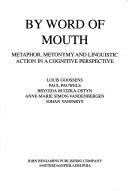
ISBN: 9027250456 9027282714 1283222086 9786613222084 9789027282712 9789027250452 1556193262 9781556193262 Year: 1995 Volume: new ser. 33 Publisher: Amsterdam : Benjamins,
Abstract | Keywords | Export | Availability | Bookmark
 Loading...
Loading...Choose an application
- Reference Manager
- EndNote
- RefWorks (Direct export to RefWorks)
This volume contains seven synchronic and diachronic empirical investigations into the expression and conceptualization of linguistic action in English, focusing on figurative extensions. The following issues are explored: Source domains, and their relation to the complexities of linguistic action as a target domain. The role of axiological parameter, the experiential grounding of metaphors expressing value judgements and the part played by image-schemata, how value judgements come about and their socio-cultural embedding. The graded character of metaphoricity and its corr
#KVHA:Linguistiek --- Cognitive grammar --- Metaphor --- Metonyms --- Pragmatics --- Values --- Axiology --- Worth --- Pragmalinguistics --- Metonymy --- Parabole --- Cognitive linguistics --- Cognitive grammar. --- Metaphor. --- Metonyms. --- Pragmatics. --- Values. --- Cognitieve spraakkunst --- Grammaire cognitive --- Grammar [Cognitive ] --- Linguistique cognitive --- Metafoor --- Metonymie --- Metonymieën --- Métaphore --- Métonymie --- Métonymies --- Pragmatiek --- Pragmatique --- Psycholinguistique cognitive --- Spraakkunst [Cognitieve ] --- Valeurs (Philosophie) --- Waarden (Filosofie) --- Psycholinguistics --- Grammar --- Aesthetics --- Knowledge, Theory of --- Metaphysics --- Psychology --- Ethics --- General semantics --- Language and languages --- Logic, Symbolic and mathematical --- Semantics (Philosophy) --- Figures of speech --- Reification --- Grammar, Comparative and general --- Philosophy --- Métaphore --- Métonymie
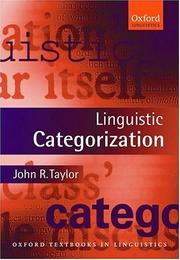
ISBN: 0198700121 019870013X Year: 1995 Publisher: London New York Clarendon Press Oxford University Press
Abstract | Keywords | Export | Availability | Bookmark
 Loading...
Loading...Choose an application
- Reference Manager
- EndNote
- RefWorks (Direct export to RefWorks)
Lexicology. Semantics --- Psycholinguistics --- Analyse linguistique (Linguistique) --- Categorisatie (Taalwetenschap) --- Categorization (Linguistics) --- Catégorisation (Linguistique) --- Cognitieve spraakkunst --- Cognitive grammar --- Grammaire cognitive --- Grammar [Cognitive ] --- Linguistic analysis (Linguistics) --- Semantics --- Semantiek --- Spraakkunst [Cognitieve ] --- Sémantique --- Sémasiologie --- Taalanalyse (Taalwetenschap) --- #KVHA:Linguistiek --- 801.56 --- Formal semantics --- Semasiology --- Semiology (Semantics) --- Comparative linguistics --- Information theory --- Language and languages --- Lexicology --- Meaning (Psychology) --- Analysis, Linguistic (Linguistics) --- Analysis (Philosophy) --- Grammar, Comparative and general --- Cognitive linguistics --- Classification (Linguistics) --- Syntaxis. Semantiek --- Cognitive grammar. --- Semantics. --- 801.56 Syntaxis. Semantiek --- Categorization (Linguistics). --- Linguistic analysis (Linguistics). --- Linguistique cognitive --- Psycholinguistique cognitive --- Catégorisation (Linguistique) --- Sémantique --- Analyse linguistique --- Categorisation (linguistique)
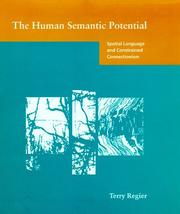
ISBN: 0262181738 0262282232 0262527308 0585032610 9780262181730 9780262282239 9780585032610 9780262527309 Year: 1996 Volume: *2 Publisher: Cambridge, Mass. London MIT Press
Abstract | Keywords | Export | Availability | Bookmark
 Loading...
Loading...Choose an application
- Reference Manager
- EndNote
- RefWorks (Direct export to RefWorks)
"Drawing on ideas from cognitive linguistics, connectionism, and perception, The Human Semantic Potential describes a connectionist model that learns perceptually grounded semantics for natural language in spatial terms. Languages differ in the ways in which they structure space, and Regier's aim is to have the model perform its learning task for terms from any natural language. The system has so far succeeded in learning spatial terms from English, German, Russian, Japanese, and Mixtec. The model views simple movies of two-dimensional objects moving relative to one another and learns to classify them linguistically in accordance with the spatial system of some natural language. The overall goal is to determine which sorts of spatial configurations and events are learnable as the semantics for spatial terms and which are not. Ultimately, the model and its theoretical underpinnings are a step in the direction of articulating biologically based constraints on the nature of human semantic systems. Along the way Regier takes up such substantial issues as the attraction and the liabilities of PDP and structured connectionist modeling, the problem of learning without direct negative evidence, and the area of linguistic universals, which is addressed in the model itself. Trained on spatial terms from different languages, the model permits observations about the possible bases of linguistic universals and interlanguage variation."
Lexicology. Semantics --- Psycholinguistics --- Cognitieve spraakkunst --- Cognitive grammar --- Connectionism --- Connectionisme --- Connectionnisme --- Connexionism --- Espace et temps dans la langue --- Espace et temps dans le langage --- Expression de l'espace et du temps (Linguistique) --- Grammaire cognitive --- Grammar [Cognitive ] --- Langage -- Expression de l'espace et du temps --- Linguistic models --- Linguïstische modellen --- Modèles linguistiques --- Ruimte en tijd in de taal --- Space and time in language --- Spraakkunst [Cognitieve ] --- Temps et espace dans le langage --- Space and time in language. --- Semantics --- Connectionism. --- Cognitive grammar. --- Linguistic models. --- Sémantique --- Connexionnisme --- Psychological aspects. --- Aspect psychologique --- -Space and time in language --- Language and languages --- Formal semantics --- Semasiology --- Semiology (Semantics) --- Comparative linguistics --- Information theory --- Lexicology --- Meaning (Psychology) --- Models, Linguistic --- Linguistics --- Typology (Linguistics) --- Cognition --- Cognitive linguistics --- Grammar, Comparative and general --- Psychological aspects --- Languages & Literatures --- Philology & Linguistics --- Linguistique cognitive --- Psycholinguistique cognitive --- Sémantique --- Modèles linguistiques --- COGNITIVE SCIENCES/General --- LINGUISTICS & LANGUAGE/General
| Listing 1 - 9 of 9 |
Sort by
|

 Search
Search Feedback
Feedback About UniCat
About UniCat  Help
Help News
News